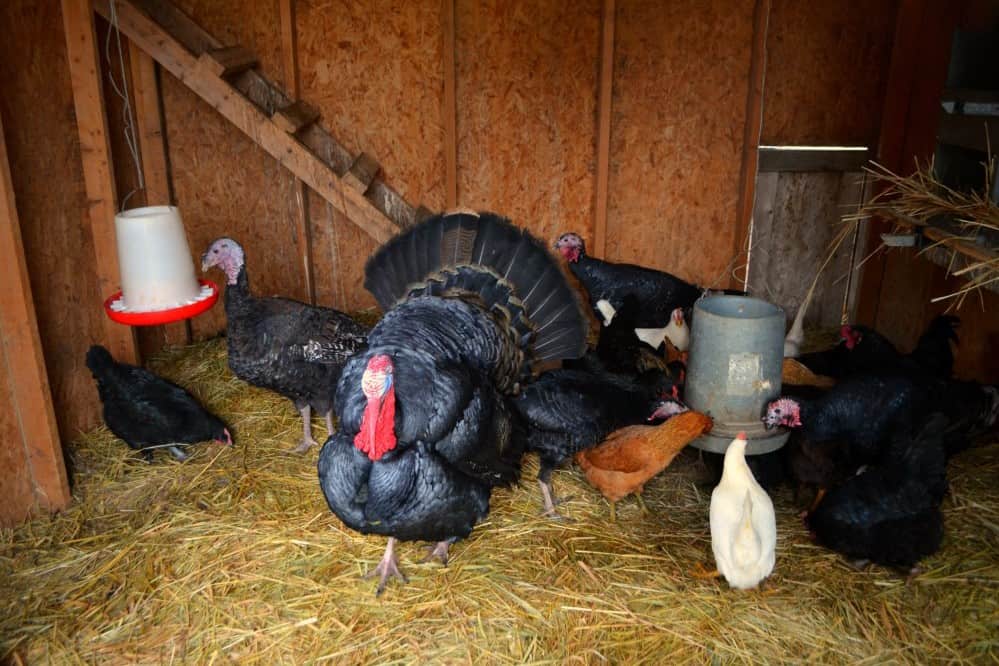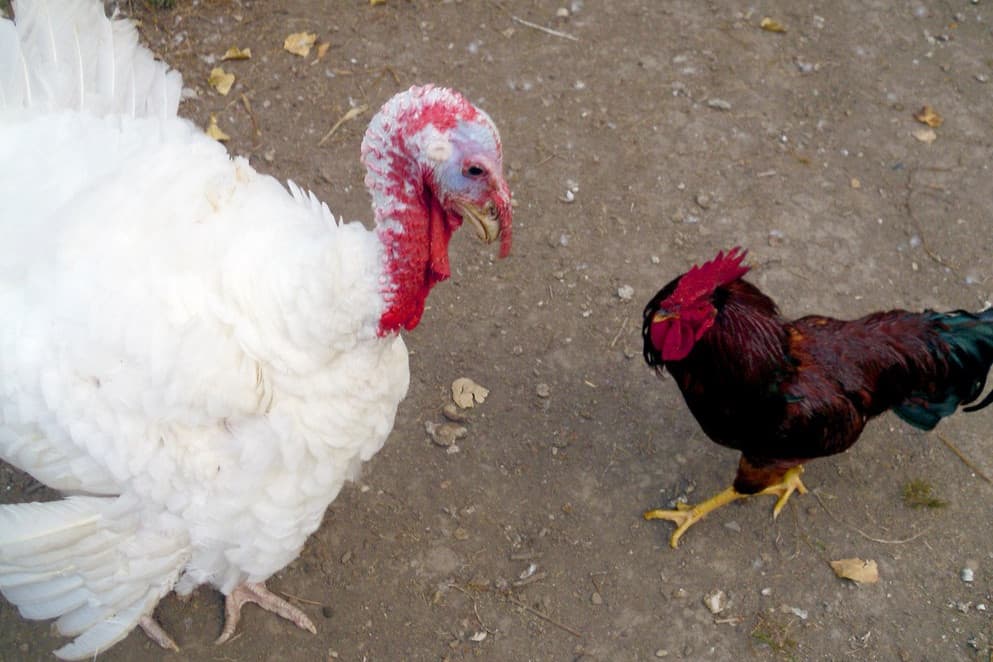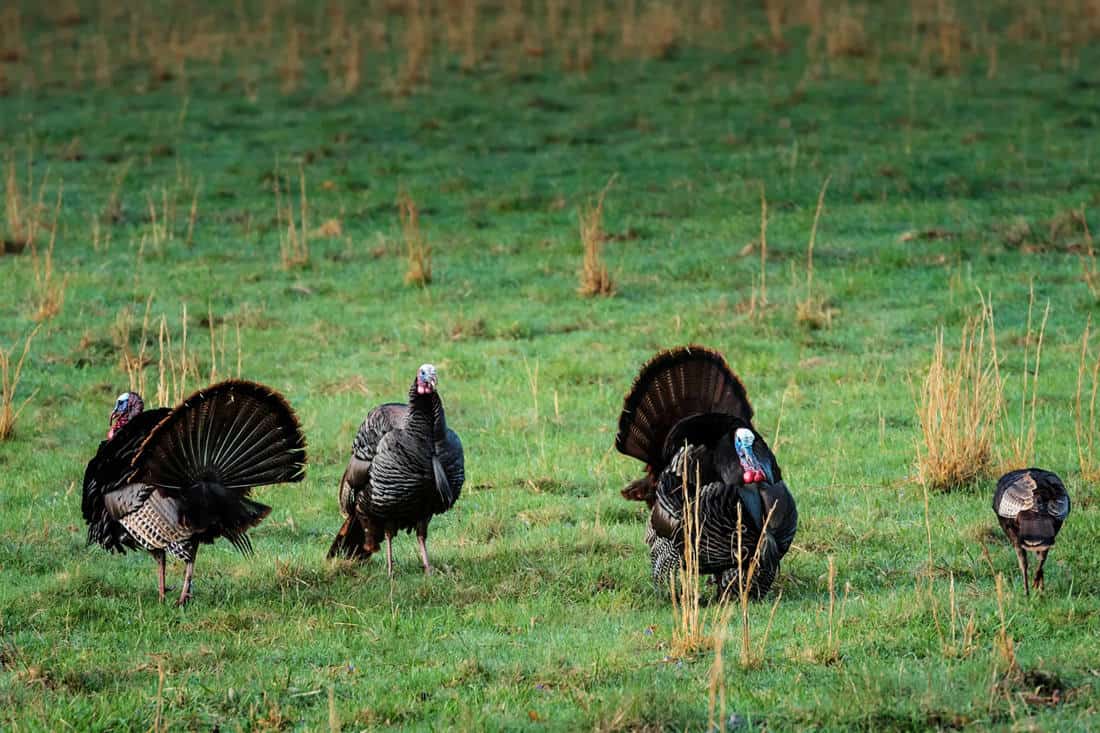Raising a type of poultry can be rewarding. What if you want to raise a mixed flock? For example, can you raise a turkey with chickens? Read on to know if it’s possible. Find out the pros and cons of adding some turkeys to your coop.
Benefits of Raising Turkeys with Chickens
Caring for turkeys and chickens at the same time is possible. Suppose you’re thinking of adding a new bird group to your flock. You might find the following benefits delightful.
Turkeys can sense predators
Turkeys will loudly gobble when faced with danger. When chickens hear this distressing sound, they will run to a safe place. They might not chase after predators, but they can send loud distress signals. They can be very good at sensing threats.

Turkeys can keep peace within the flock
Turkeys may be bigger than chickens, but they are generally calmer. So, there’s very little chance of fights erupting. These gentle giants also are the peacekeepers in the coop. They can mediate between two chickens and end the fight.
Turkeys can be surrogate mothers
Turkey hens can be great mothers to baby chickens. If you add new chicks to your flock, a mama turkey will care for them. Young chickens can seek warmth and guidance from these wise elder birds.
Turkeys can provide diversity in meat and eggs
Adding another flock of birds means you’ll have twice as many eggs and meat. It adds diversity to your harvests. It would be nice to have turkey and chicken meat for sale or personal use.
Turkeys can socialize with chickens
Interestingly, chickens can live harmoniously with turkeys. These birds are known to be social animals. Additionally, they love being part of a big flock. Turkeys may seem intimidating. But they rarely get into a fight with other birds. It’s good to know that peaceful coexistence is possible.
A farmer shares her experiences raising a mixed flock in this video.
Risks of Raising Turkeys with Chickens
Turkeys and chickens are highly compatible. Raising them together is possible, but there are risks involved. It’s best to consider the following downsides before pursuing a mixed flock.
Blackhead disease
Most veterinarians recommend against keeping a mixed flock because of blackhead disease. It is the riskiest factor affecting turkeys and chickens in the same area.
This disease affecting turkeys comes from a parasite. Typically, it kills 80% to 100% of infected birds. It spreads through contaminated feces, food, water, worms, or direct contact with other sick birds.
The parasite can survive for up to three years underground. There is always a threat that the disease will resurface anytime. Suppose there is no direct contact between healthy and infected birds. There is still a chance for the infection to spread through their environment.
Chickens are also prone to blackhead disease but less likely to exhibit symptoms. They usually suffer a minor illness and survive. However, they can still spread it to turkeys. Turkeys are more susceptible to the disease. They have a low survival rate against Blackhead disease.
Here is a video that discusses blackhead disease in turkeys and chickens.
Problems in the coop
Chickens and turkeys can live together. But can they comfortably share one coop? These birds may have similar housing needs, but their space requirements differ. Turkeys are bigger than chickens, so they need a bigger roaming space. A small coop may make them feel cramped. Stretching their wings will also be hard for them.
Keeping turkeys and chickens in an enclosed run can also be challenging for them. The more giant birds need more perching space than chickens. They’d be uncomfortable and fussy if they couldn’t perch properly.
It can be a problem if owners can’t accommodate the size requirements. A crowded coop can have the following issues:
- It can get dirty quickly.
- Birds who can’t exercise freely tend to be aggressive toward one another.
- It can stress the chickens and turkeys, leading to poor egg production.
- The flock may fight, injure, or kill one another.
- Diseases can be uncontrollable.
- Hens may break or eat their eggs out of stress.
Brooding issues
Hens tend to be eager and aggressive when they’re brooding. They can easily get irritated by turkeys. There’s a chance they’ll trample and peck on the turkeys, especially the little ones. Feisty momma chickens may scare off fragile baby turkeys. It can lead to a weakening of their immune systems.
Turkeys, on the other hand, are more gentle when brooding. They are more than willing to hatch chicken eggs. However, they can accidentally hurt the chicks due to their size and clumsiness.
Considerations in Raising Turkeys and Chickens Together

You can successfully raise turkeys and chickens together. However, it would help if you considered the following factors before raising a mixed flock.
Coop Size and Structure
A cramped coop can cause many problems to your flock. So, the size and structure of their living area are crucial parts of mixed flock raising. You must consider the size of the turkeys when planning the coop. They will require more space than chickens. Please ensure that the enclosure is enough for both groups to live comfortably.
A turkey’s feet are also bigger than a chicken’s. It’s best to provide a sizeable roosting stick to accommodate their feet. You also need to install perches as high as trees.
In addition, it would help to provide the following:
| Turkeys | Chickens | |
| Nesting boxes | 18” x 18” x 18” | 12” x 12” x 12” |
| Indoor space | 10 square feet per turkey | 2 square feet per chicken |
| Outdoor space | 25 square feet per turkey | 4 square feet per chicken |
Diet
Remember that meat turkeys are voracious eaters. They require plenty of protein-rich feed so they can grow large fast. Ideally, turkeys need 26% of protein to thrive. This amount is higher than a chicken’s dietary requirement.
Adult chickens can live on a high-protein diet, but it might be too much for young birds. Young chickens exposed to too much protein will grow large quickly. It can lead to several health issues. So, separating the two groups is best until they are adults.
A mixed flock can eat the same food if you raise turkeys as pets or egg producers. They might grow slower if they eat chicken food.
Biosecurity Measures for Blackhead Prevention
The foundation of a healthy flock is a suitable biosecurity protocol. Biosecurity refers to exercising safety measures that can protect the birds from diseases. The following are best practices for your farm:
- Purchase the birds from reputable breeders.
- Quarantine new birds before introducing them to your flock
- Disinfect all boots, clothing, and equipment after returning from poultry shows or other farms.
- Inspect birds every day to check for disease signs and symptoms.
- Clean their living quarters regularly.
- Maintain separate equipment for each group.
- Deworm the birds regularly.
This video reveals more tips on raising chickens with turkeys.
Frequently Asked Questions
The following are some common questions asked by people who want to raise a mixed flock. We’ve gathered answers from those who have experienced raising turkeys and chickens together.
Can chicken eggs hatch under a broody turkey?
Yes, chickens can hatch under a broody turkey. However, you need to monitor them closely since turkeys are big. They might squish or trample on the chicken eggs.
Can turkey eggs hatch under a broody chicken?
Yes, a broody hen can hatch turkey eggs. You can place the eggs under a broody hen. It is ideal since the incubation temperature of turkey and chicken eggs is the same. However, the mama hen must warm the turkey eggs longer than usual. Turkey eggs hatch in 28 days. On the other hand, chicken eggs only need 21 days.
Can you raise poults and chicks together?
It is not advisable to raise poults and chicks together. Adult birds can handle the mixed flock situation, but the babies cannot. Chicks tend to be more restless and energetic than poults. Meanwhile, poults are calmer and more sensitive. Keeping them together may lead to bullying and injuries.
Can poults and chicks eat the same food?
Poults and chicks have different dietary needs. Poults require a 24- 30% protein diet to grow healthy and strong. They may suffer from diseases if they don’t eat enough protein. On the other hand, chicks only need 18-29% of the protein in their diet. It’s not advisable to feed these young birds the same food. However, you can raise them together when they’re adults.
Can a turkey mate with a chicken?
A turkey and a chicken can mate. The offspring is a chicken and turkey hybrid. Naturally, chickens and turkeys will mate with their kind. Interbreeding is an infrequent occurrence, but it is possible. However, they might be forced to interbreed when they can’t find a mate.
Conclusion
Can you raise turkeys with chickens? Yes, you can! These two bird groups can live harmoniously with the right living conditions. There are benefits and risks associated with raising a mixed flock. So, it’s best to consider all the factors needed for them to thrive.

Joseph Hudson has been raising chickens for over 15 years. In 2018, he completed the Agriculture & Natural Resources program at Mt. San Antonio College. He currently raises over 1400 chickens on his 7.5-hectare farm. He keeps sharing his experience on raising healthy and happy chickens on Chicken Scratch The Foundry.







